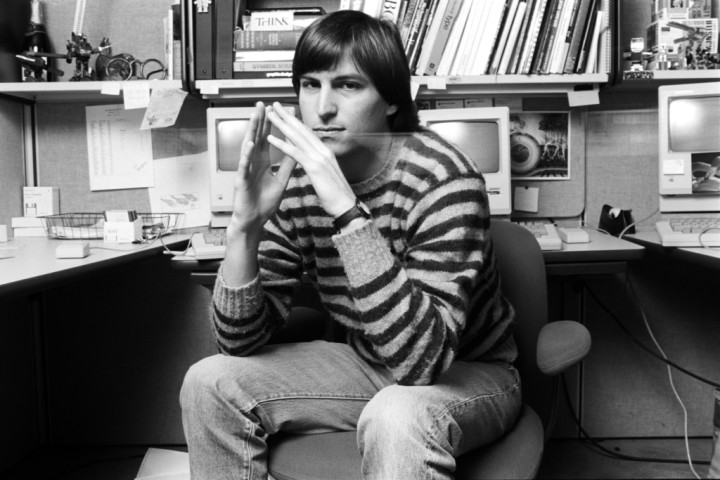If you are a member of the Steve Jobs fan club, you can probably bump this review up a half-star — or down one, if you can’t stand criticism of the film’s subject. (This is no Valentine.) Alex Gibney’s Steve Jobs: The Man in the Machine is fine — assuming you either know very little about Jobs, or find him endlessly fascinating and dote on everything Apple. If not, you’re in for an unconscionable 128 minutes — far too long for almost any documentary — that tells you that Jobs was a brilliant self-promoter and entrepreneur and a pretty lousy human being. These are things I knew, perhaps in less detail, 128 minutes earlier — so, for me, there was a central lack of revelation going on here. However, what the film lacks in revelations, it almost makes up for in ruminations.
Where Gibney’s film works best lies in its consideration of the effect of Jobs on our collective conscious. In fact, he opens his movie questioning the amazing — even bizarre — public displays of grief over Steve Jobs’ death, treating his passing as if he was the most iconic of rock stars (or maybe Princess Di). Setting aside the (seemingly growing) human need to make one’s self important by latching onto any event and claiming a place in it, Gibney looks at the peculiar cult-following enjoyed by Jobs — a cult that elevates the man who sold stylish (and pricey) computers and cell phones to the world. Sure, these products were part of a vision that was made possible by Jobs’ brilliance at marketing, but it’s not like Jobs invented or made these items himself.
The closest comparison in terms of taking credit for the work of others is probably Thomas Edison. Or maybe Walt Disney. But they tended to present themselves in the role of the kindly uncle. Not so Jobs. Jobs wanted to be the hippest and coolest guy around — a rebel, an underdog and maybe even a bit of an outlaw. (Jobs and his friend — and Apple co-founder — started out with Wozniak’s creation of a device that tricked the phone company into allowing its user to make free long-distance call. This was “sticking it to the man,” and who doesn’t love the idea of sticking it to the phone company?) It was the genius of Jobs’ knack for self-promotion (and self-mythologizing) that he made himself into an iconic figure by association — equating Apple (and himself) with figures like John Lennon and Albert Einstein (among others) by using their images in advertising. The idea was clear. Here was a guy as smart as Einstein and as cool and creative as Lennon — a genius among geniuses.
This, of course, isn’t all. Jobs took the idea of computers from being frightening (they’ll take our jobs) and incomprehensible, and turned them into something (seemingly) non-threatening and easy to use. He may have been a glory hog and he may have failed utterly as a human being — things the film clearly presents — but he did change the world. The question of whether or not this was a good thing still plagues us, and the film notes this, too. Does the easy connectivity of computers and cell phones really bring people together? Or does it allow the illusion of human connection without actually having to deal with other people? While everyone has an opinion on this, no one has an actual answer and Gibney doesn’t pretend to know either. (He has an obvious skepticism.) That this question is unanswerable doesn’t mean it shouldn’t be asked. It is this and the depiction of Jobs’ self-made myth that makes The Man in the Machine far more compelling than any of its not very revelatory revelations that the man was — to put it mildly — deeply flawed. Rated R for some language.
Playing at Carolina Cinemas.







Before you comment
The comments section is here to provide a platform for civil dialogue on the issues we face together as a local community. Xpress is committed to offering this platform for all voices, but when the tone of the discussion gets nasty or strays off topic, we believe many people choose not to participate. Xpress editors are determined to moderate comments to ensure a constructive interchange is maintained. All comments judged not to be in keeping with the spirit of civil discourse will be removed and repeat violators will be banned. See here for our terms of service. Thank you for being part of this effort to promote respectful discussion.